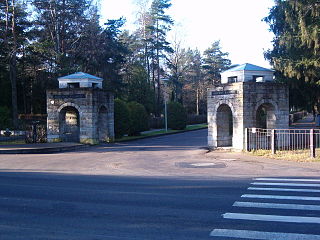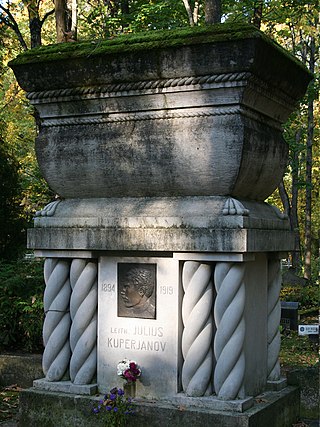
Igor Severyanin was a Russian poet who presided over the circle of the so-called Ego-Futurists.

The Alexander Nevsky Cathedral of Tallinn is an Eastern Orthodox cathedral in central Tallinn, Estonia. It was built in 1894–1900, when the country was part of the former Russian Empire. The cathedral is the city's largest cupola church. The late Patriarch Alexy II of Moscow (1929–2008) started his priestly ministry in the cathedral. It is the primary cathedral of the semi-autonomous Estonian Orthodox Church of the Moscow Patriarchate.
Jaan is an Estonian masculine, a cognate of the English-language given name John.

Rahumäe Cemetery is a cemetery located at Rahumäe in Nõmme District, Tallinn, Estonia. This municipal cemetery was established in 1903 on 29 hectares of land to meet the needs of the growing population of Tallinn. A number of congregations are present including a Jewish section established in 1911. This forested cemetery is notable for its many works by famous sculptures and chapels present within its grounds.

Aleksander Klumberg was an Estonian decathlete. He competed in several events at the 1920 and 1924 Olympics and won a bronze medal in the decathlon in 1924. In 1922 he became the first official world record holder in the decathlon, albeit with a performance inferior to the Stockholm 1912 series of Jim Thorpe.
The 1924 Estonian coup d'état attempt was a failed coup attempt in Estonia on 1 December 1924, conducted by the Comintern, and staged by the Communist Party of Estonia and Bolsheviks who in most part had been infiltrated from the Soviet Union. Of the 279 actively participating pro-communist rebels, 125 were killed in action, later more than 500 people were arrested. The Estonian government forces lost 26 men.

The Kopli cemetery was Estonia's largest Lutheran Baltic German cemetery, located in the suburb of Kopli in Tallinn. It contained thousands of graves of prominent citizens of Tallinn and stood from 1774 to shortly after World War II, when it was completely flattened and destroyed by the Soviet occupation authorities governing the country at the time. The former cemetery is now a public park.

Aleksander Warma VR I/3 was an Estonian navy officer, diplomat and painter.

Jaan Arder was an Estonian singer. He was a member of the rock band Apelsin and the early music ensemble Hortus Musicus.

Raadi cemetery, is the oldest and largest burial ground in Tartu, Estonia, dating back to 1773. Many prominent historical figures are buried there. It is also the largest Baltic German cemetery in Estonia after the destruction of Kopli cemetery in Tallinn. Until 1841, it was the only cemetery in the town.
Roman Steinberg, was an Estonian Greco-Roman wrestling bronze medal winner in middleweight class at the 1924 Summer Olympics in Paris, France. Steinberg was also three times Estonian wrestling champion 1921–1923, coached by Robert Oksa. He died after contracting tuberculosis, age 39, and was buried at Alexander Nevsky Cemetery, Tallinn.
Jaan Kärner was an Estonian poet and writer. He is known especially for his nature poetry. Many of his poems were set to music by Estonian composers of choral music. Kärner also wrote numerous novels, plays, works of literary criticism, and scientific literature and historical treatises. He translated works from German and Russian, most notably the poems of Heinrich Heine into Estonian in 1934.

Hageri is a small borough in Kohila Parish, Rapla County, northern Estonia. As of the 2011 census, the settlement's population was 212. Hageri has an area of 105 ha.
100 great Estonians of the 20th century is a list of notable Estonians compiled in 1999 by Eesti Entsüklopeediakirjastus, Eesti Päevaleht, National Library of Estonia, Radio Kuku, and TV3.

Erast Georgievich Hiatsintov was a Russian Empire politician who was the mayor of Reval in from February 1905 to December of that year, notably becoming the first person of Russian descent to become the mayor of Reval. Consequently, he was also the first person of non-Baltic German descent to become mayor, the culmination of an Estonian-Russian political alliance, created by future Estonian president Konstantin Päts and Jaan Poska that broke the power that Baltic Germans had in the political system of the city for centuries.
Aleksander Pallas was an Estonian lawyer and politician who was the acting deputy mayor of Tallinn from 13 November to 25 November 1917. He graduated from the Faculty of Law at Moscow State University. A lawyer in Tallinn, he worked alongside Otto Strandman as a city councilor. He participated in the Estonian War of Independence. Pallas was the first mayor after the German occupation of Estonia during World War I, serving as the acting deputy mayor for all of 12 days. Despite being temporary, the brief mayoralty set the stage for the building up of Tallinn as the capital of Estonia. He was succeeded by Aleksander Hellat. He died on 7 January 1939 and was buried at Alexander Nevsky cemetery.

Patarei Prison, also known as Patarei Sea Fortress and Tallinn Central Prison, commonly known as The Battery (Patarei), is a building complex in Kalamaja district of Tallinn, Estonia. The premises cover approximately four hectares of a former sea fortress and prison, located on the shore of Tallinn Bay.
Aleksander Aben was an Estonian politician. He was a member of VI Riigikogu. On 26 August 1939, he was removed from his position and he was replaced by Aleksander Jõeäär. After years in exile in the USSR and return to Estonia he was imprisoned in 1950, then rehabilitated in 1950.

Voldemar Päts was an Estonian cinematographer and actor.













